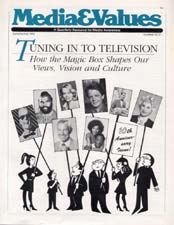Use TV to Exercise Values
|
This article originally appeared in Issue# 40-41
|
- Keep up with what's on TV.
Watching and discussing television programs — movies, specials, even regular series — can be an excellent way to exercise personal values. Dialogues built around TV shows, however, cannot be as carefully planned and structured as other group activities in your school. church synagogue or youth program. The TV networks often do not schedule shows until two or three weeks before air dates. You will have to make a point of looking out for good programs in order to provide continuity for your group. Check a TV guide regularly and watch newspapers and magazines for articles and interviews about upcoming programs. If you personally do not have time to follow television, recruit a "TV monitor" from your group to keep an eye out for interesting shows. - Take notes when you watch.
Write down the names of the main characters and note key scenes and turning points in the plot. Copy dialogue that impresses you. Use these notes to review the program at the beginning of your discussion. Even engrossing storylines can be quickly forgotten and, unless you am holding a discussion immediately after viewing, such a review is needed to get people back in the mood of the program. This technique also saves time because the group does not have to reconstruct the story. - Don't try to be a TV "expert."
Chances are good that people in your group watch as much, if not more, television than you do. For every generalization you make as the 'expert," they can cite an exception. There are hundreds of hours of programming televised every week. Rather than acting as the interpreter, listen to what your people have to say. Create a feeling of community based on mutual respect of each other's experiences and openness to all views. - Start with good questions.
Remember that values questions have a you in them. The goal is to involve people in relating what they see on the screen to their own lives, not to analyze the filmmaker's technique or to engage in intellectual criticism. Avoid questions that can be answered with a simple yes or no. Concentrate on questions that ask: "What do you think?" "How would you have acted?" "How did you feel when (the character) did (such and such)?" The important thing is not to stick rigidly to a preordained set of questions but to allow the conversation to flow along a values and feelings track. - Be selective in choosing programs.
Some TV shows, no matter how popular, are sheer fluff. Concentrate your time on shows with substance, shows that are worth talking about. Movies-made-for-television are an especially good genre for discussion purposes.



